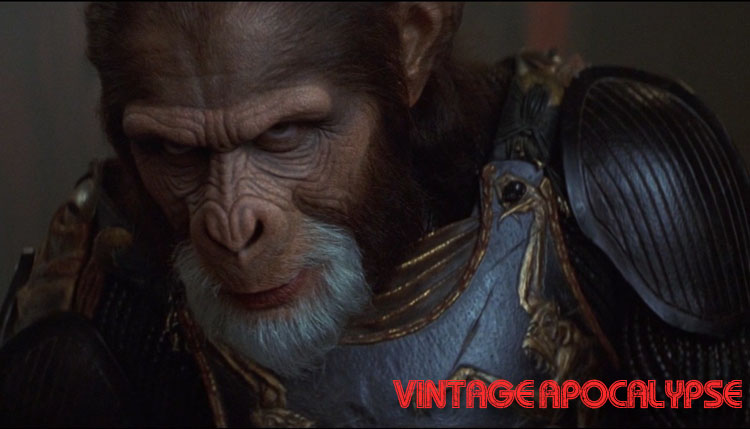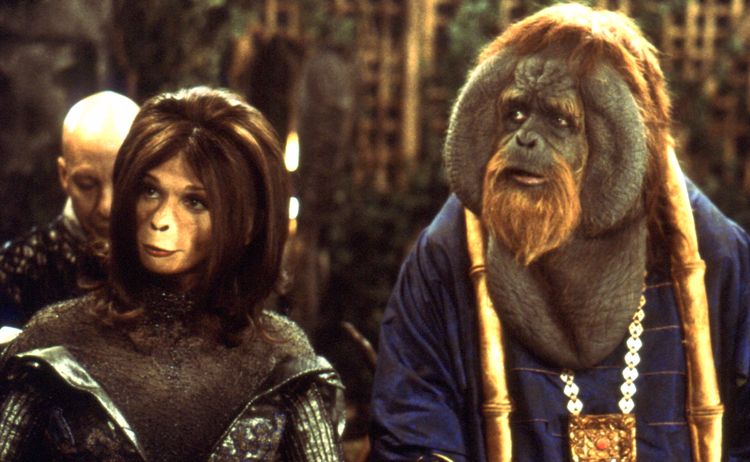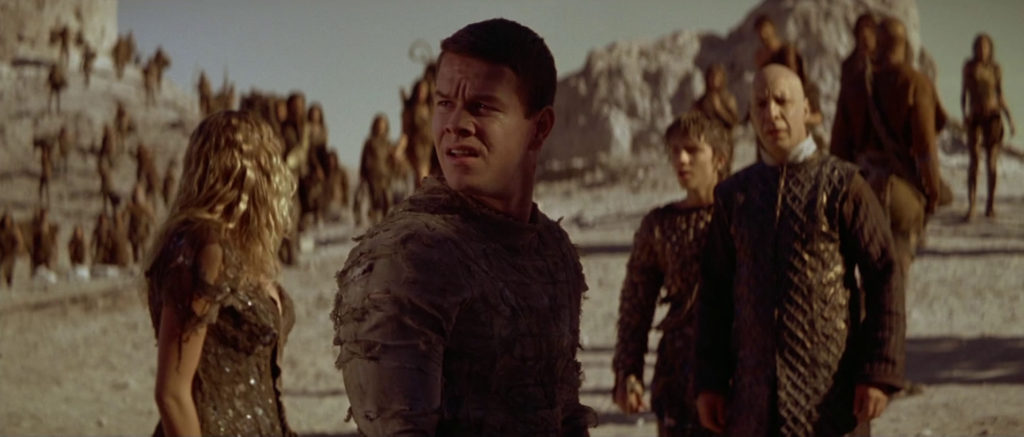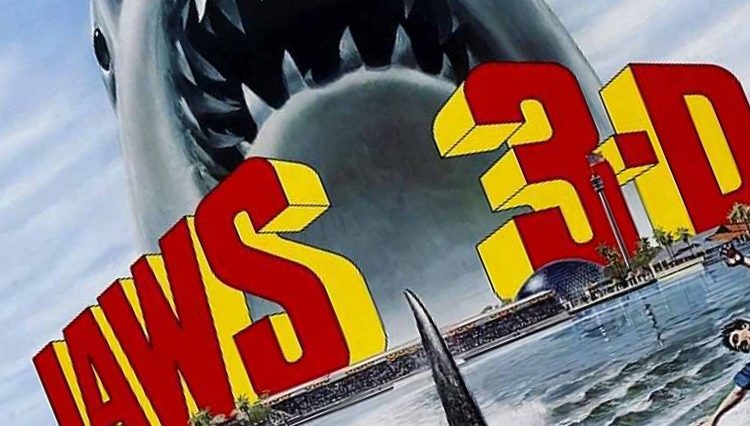“I warn you their ingenuity goes hand in hand with their cruelty. No creature is as devious, as violent.”
Planet of the Apes, 2001 (Mark Wahlberg) 20th Century Fox
I was thinking about all the reasons why Tim Burton’s 2001 Planet of the Apes fails so spectacularly on nearly every level of storytelling, but I kept placing my hands flat on a keyboard and staring at my decorative 2020 tapestry calendar. It’s a nice piece of décor. “Enjoy the little things,” it tells me, accompanied by an image of a jar of flowers. Enjoy the little things. It’s downright profound because it is the little things in the movie I enjoy. It’s not the story. The story makes no sense to me. It’s not the editing.
The editing only makes the nonsensical story worse. It’s not Marky-Mark. In fact, I can’t imagine why anyone would want to see a movie just because Marky-Mark is in it. Harrison Ford? Possibly. Tom Cruise? Probably. Mark Wahlberg wasn’t even a name in 2001. Yeah, Boogie Nights was definitely a thing, but I don’t know that it was Mark Wahlberg who put asses in the seats, and even then it wasn’t much of a hit. It was a movie people talked about, but did anyone see it? Enjoy the little things.
What are the little things? The big worry with me about a remake (or “reboot”) of Planet of the Apes is the make-up, even though it isn’t that much of a concern, but I’m pretty sure that’s what audiences were thinking. We know makeup and visual effects have evolved considerably since the 1968 movie, for which John Chambers won a special Oscar™. Further, we know six-time Oscar™-winner Rick Baker is handling those chores (taking over for Stan Winston after early aborted attempts), and he made a werewolf come to life.
This was back in the days when the director had a choice as to whether he would use CGI or practical makeup effects. Burton went with Baker after the latter got an Oscar™ for Ed Wood. Now, everything is CGI, which is one of the reasons Baker retired from the business. The movie is an incredible piece of production design — one of the best I’ve ever seen, yet it received no nominations in any of the technical categories. The movie even made money. It didn’t turn as big a profit as I suspect 20th Century Fox hoped, but it was a hit. It wasn’t enough of a hit to sustain the franchise.
On board the space station Oberon, astronaut Leo Davidson (Wahlberg) sends his pet chimpanzee, Pericles, in a small shuttle to monitor an electromagnetic storm. When Pericles doesn’t return, Leo decides to get into a shuttle to find him. He disappears as well, but he wakes up on an alien planet dominated by — you guessed it — APES! Apes evolved from man, humans are treated as inferior and sold as slaves, you get the idea. For the most part, we’re looking at the movie through the perspective of Wahlberg’s character, but he has so little dialogue, it’s hard to know what’s happening in any given scene that involves him.
Helena Bonham Carter plays Ari, the daughter of an old senator (David Warner) who is probably the “liberal” analogue of the piece; a supporter of human rights betrothed to the vicious General Thade (Tim Roth). It’s obvious we’re not going by-the-book of a straight remake, but rather trying something a little different. The problem is when you’re trying something different, you need to lay out all your story cards (at least in the proper order) on the table, otherwise the audience will become hopelessly confused. We get a couple of necessary components, but we don’t get the whole story.
Ari “purchases” Leo along with a small family he has adopted and, almost immediately, helps him escape so he can find his ship, shuttle, or some remnant of his past life. There’s a place where apes (and humans alike) are forbidden to go called “Calima.” Thade’s father, the ailing Zaius (Charlton Heston in an uncredited cameo) tells his son they must stop the spaceman from getting to Calima. It turns out “Calima” is Leo’s crashed space station; “Calima” being an abbreviation of “Caution: live animals.” This is when the movie gets extremely silly and weird in a hurry. Nevermind all the screaming, jumping, and snorting from our lead apes, a tribe of freed humans follows Leo to “Calima” where he is able to access the computer and discover the truth of what happened.
The chimpanzees they took along with them on their mission eventually revolted against their aging human masters (and we hear this hilarious chimp screaming in the background as they try to make their log entries) and become the progenitors of an evolved species of ape! The movie could have been re-cut as a comedy and nary miss a beat! Leo blames himself, though I don’t see how he could be directly responsible, but in short order, a war between humans and apes looks to be inevitable. I’m still trying to enjoy the little things.
Planet of the Apes is absolute madness. It’s a movie that makes no sense. I’ve seen all manner of badly-edited chaos, but I’ve never seen anything this terrible. It’s unfortunate the Golden Raspberry Awards do not have a category for editing (and absurd because, as we know, editing can make or break a movie) as Chris Lebenzon would’ve “won” this award. I also believe Fox tampered with the film. Any and all instances of character motivation were removed from the movie, thus eliminating any tension, or reason to care about the characters.
The storied history of the Planet of the Apes reboot goes back to 1988 and Adam Rifkin, who turned in a draft of a story he wanted to make. With regime changes at Fox over the next 12 years, the development of the script changed hands every few months. James Cameron was involved at one point, as well as Peter Jackson, Sam Raimi, Arnold Schwarzenegger, and Oliver Stone. The project eventually fell to Cast Away writer William Broyles Jr. and Tim Burton. With the exception of 2003’s Big Fish, Planet of the Apes would mark the beginning of Burton’s dark years, lazily stumbling from one uninspired film to the next.







